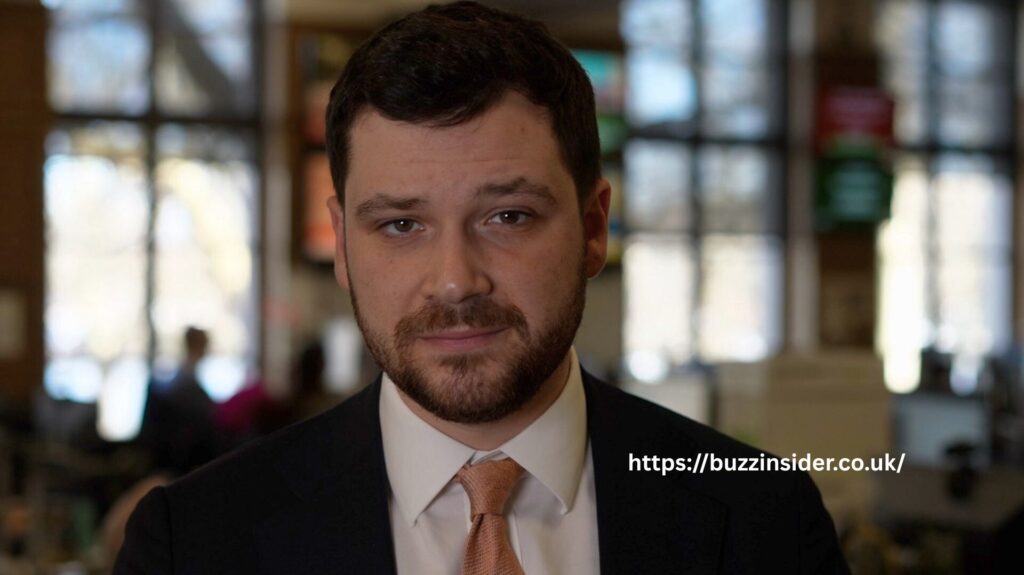There’s something about Henry Zeffman’s story that feels like watching someone who both loves politics and loves writing find their lane perfectly. He didn’t stumble into journalism by accident — his path shows curiosity, smarts, and seizing opportunities. Here’s how it all fits together.
Early Life & Education
- Henry Zeffman grew up in London, attending Highgate School — a well-known independent day school in North London.
- From early on, he showed academic promise and an interest in political ideas, governance, public affairs. These leanings would shape his later work.
- For university, he went to Brasenose College, Oxford, reading Philosophy, Politics and Economics (PPE) — a classic route in the UK for someone wanting to understand how politics, philosophy and policy intertwine.
- While at Oxford, Zeffman was active beyond just classes. He was president of the Junior Common Room (JCR) in 2014 at Brasenose. That role gave him experience with leadership, negotiation, understanding people’s concerns — all useful things in journalism.
Early Career & First Big Breaks
- One of the big early recognitions was when Zeffman won the 2015 Anthony Howard Award for Young Journalists. He was about 21.
- That award is a serious deal. It came with fellowships at major outlets (The Times, The Observer, New Statesman) and was judged by well-known names (Jeremy Paxman, Robert Harris, etc.).
- This award didn’t just look good on paper — it opened doors. Zeffman’s clarity in writing and ability to think through political issues already gave him an edge. He used that early momentum.
Climbing Up Work at The Times
- After university, Zeffman joined The Times, one of Britain’s leading newspapers. Over the years, he held several roles:
- Political Reporter / Correspondent — cutting his teeth covering UK politics, party leadership, elections, that sort of thing.
- Washington Correspondent — giving him exposure to international political coverage, foreign policy angles, seeing how UK politics looks from abroad.
- Later, he became Associate Political Editor at The Times.
- Along the way, he won accolades such as Young Journalist of the Year at the 2019 National Press Awards.
- His writing at The Times was recognized not only for breaking stories, but also for explaining political complexity in ways that regular people could grasp — without losing nuance. That’s part of how he became visible as someone you could trust on politics, not just someone who reports it.
Turning Point Joining BBC
- In June 2023, it was announced that Zeffman would leave The Times to join BBC News as Chief Political Correspondent.
- That’s a major role. The BBC is hugely visible; being Chief Political Correspondent means you’re often front and centre for big political stories, live coverage, analysis, shaping how those stories are told. It’s a signal that many consider him one of the top voices in UK political journalism.
Key Moments & Reporting Highlights
Some of the moments and themes in Zeffman’s career that stand out:
- Brexit and Post-Brexit Politics
As with many UK political journalists of his generation, Zeffman covered Brexit in depth. The debates, negotiations, fallout — his insights in that period helped to build his reputation. Though I don’t have a single “Brexit scoop” I can pinpoint right now, the way he handled reporting and analysis during that era helped him stand out. - UK General Elections & Party Leadership Changes
Zeffman has been involved in covering several leadership contests — Conservative leadership, Labour leadership, shifts in party direction — as well as general elections. These are high-pressure, high-visibility moments. Doing well here is a test of every political correspondent. - Washington Correspondent Role
Spending time covering US politics (from London or in Washington) sharpened his comparative understanding: how media works elsewhere, how political stories translate across cultures, what matters to audiences about foreign affairs. This broadened his perspective beyond purely UK domestic politics. - Accolades & Awards
- Anthony Howard Award (2015) — early in career, big sign of promise.
- Young Journalist of the Year (2019) at the National Press Awards.
- The transition to the BBC (2023) is itself a key moment. For many journalists, moving to the BBC from a newspaper signals increased public profile, often more broadcast exposure, and influence in shaping how political news-analysis is delivered.
What Makes Him Stand Out
From what I can piece together, these are some of Henry Zeffman’s strengths and what sets him apart:
- Analytical clarity + accessibility: He seems to combine seriousness (deep knowledge, well-researched) with an ability to explain politics in ways people outside Westminster understand. That’s rare and valuable.
- Balanced reporting: He isn’t known for bombast or sensationalism; rather for aiming to get the facts, get good sources, and let the analysis emerge from those.
- Adaptability: He’s covered UK politics, done foreign-assignment type work (Washington), then shifted to a top role in broadcast-oriented BBC. Navigating those different kinds of media and demands (print, digital, televised, live) means he knows how to adjust.
- Early leadership roles: Even in university (JCR president), early awards, etc., he seemed drawn to stepping up — not just reporting, but engaging with systems, institutions. That kind of initiative opens doors.
Recent & Ongoing Work
- Since becoming Chief Political Correspondent at the BBC in mid-2023, Zeffman has been involved in major parliamentary coverage, analysis of government policy, internal party dynamics, and election related reporting.
- He continues to maintain a public presence (e.g. social media, commentary), which helps the public see inside some of the behind-scenes of politics — not just what happens, but why it matters.
Personal Notes & Background
- He has siblings: a brother named Oliver Zeffman, who is a conductor, and a sister who studied law.
- His family has cultural and academic leanings, which seems like it helped shape an environment where thinking, art, debate were valued. Not that this alone makes someone a top journalist, but it helps for someone with his inclinations.
What the Future Might Hold (Thoughts)
Putting myself in his shoes and looking forward, here are some plausible directions for Zeffman:
- More visibility on broadcast and multimedia platforms: with his role at the BBC, expect more appearances on TV, radio, maybe podcasts.
- Deep investigative political work: stories about systems, accountability, party financing, etc. He already has the credibility; pushing further into long-form or investigations seems likely.
- Mentorship and thought leadership: often people in his position become voices about the future of journalism, press freedom, ethical coverage. He might write/comment more not just news, but about how news should be done.
- Larger institutional roles: perhaps editorial oversight or leadership in political journalism beyond reporting, shaping coverage strategy.
Why His Story Matters
I think Zeffman’s path connects with a lot of people’s hopes for journalism: that reporting isn’t just loud, but useful; that you can be rigorous without being boring; that you can move up without losing integrity. He’s someone who seems to show that ambition + care can coexist.



